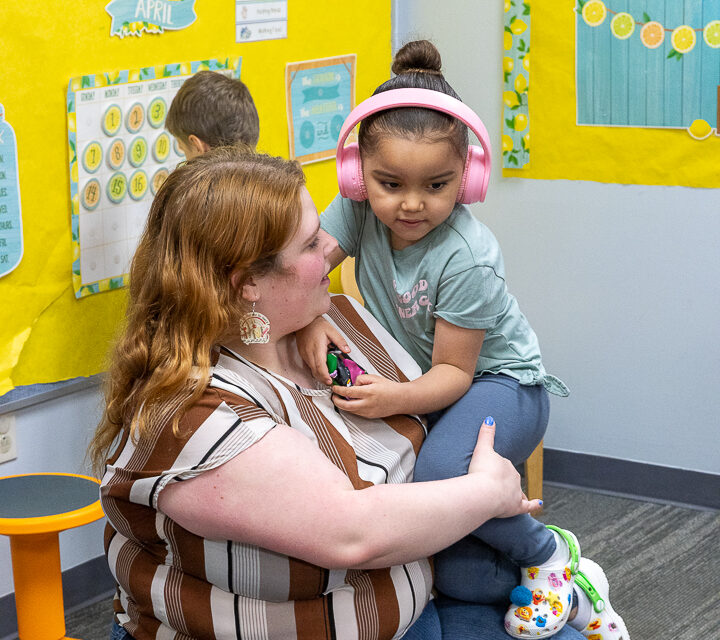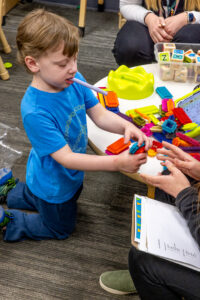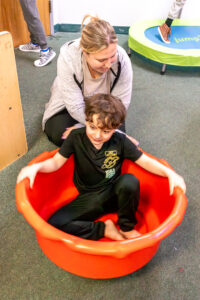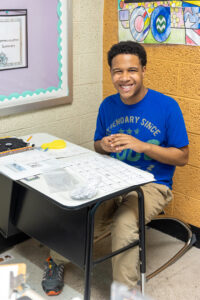Pyramid Consultant Jesseca Collins, M.Ed., BCBA writes about the importance of valuing our learners as human first and prioritising what is meaningful to them.
Prioritising Dignity and Connection 
Working with individuals who have learning disabilities and autism is a genuine privilege. At Pyramid, the diagnosis itself isn’t our main focus—because every individual we support is a person first. When designing and delivering support, we believe in being adaptable, always prioritising the skills and goals that are most meaningful to each learner.
Whether you’re a teacher, teaching assistant, speech and language therapist, occupational therapist, psychologist, behaviour analyst, or any other professional working in education or therapy in the UK, one thing is universal: our learners don’t care about our qualifications or job titles. What they care about—what really matters—is the quality of the relationship we build with them.
We must show up in a way that meets each learner where they are and helps guide them towards where they want or need to be. While we often monitor skill acquisition and progress, we should also be asking: “Is this learner enjoying their time with me?” Let’s make sure they are safe, engaged, challenged, and—above all—supported in ways that are genuinely individualised.

Understanding Contextually Inappropriate Behaviour (CIB)
Supporting learners who engage in contextually inappropriate behaviours can be challenging. These behaviours are sometimes labelled as “challenging”, but we should pause and ask: challenging to whom? From a compassionate, learner-centred perspective, if a behaviour continues to occur, it’s likely meeting a need or serving a function for that individual—it’s adaptive for them.
Let’s also acknowledge this: we all exhibit contextually inappropriate behaviour at times! Our role is to understand why a behaviour is effective for the learner and to work collaboratively to teach alternative skills that are more socially or contextually acceptable—but still meet the same need.
Importantly, the responsibility for change doesn’t sit solely with the learner. We must reflect on the environments in which our learners live, learn, and communicate, and consider how our own behaviour can evolve to better support their development, dignity, and happiness.
Individualising Skill Development for Real-Life Relevance
The Pyramid Approach to Education® allows us to build inclusive, effective educational environments, wherever they may be. What stands out about this model is its flexibility—it doesn’t limit us to a single curriculum or predefined set of skills.
Whether a learner in rural Pembrokeshire needs to learn to help feed the chickens on their family farm, or a young person in London is learning to navigate the Tube and buy their favourite snack from the corner shop, we can support them in building those real-life, functional skills.
There is no “one-size-fits-all” approach to teaching. As professionals, we need well-equipped toolkits that draw from a range of evidence-informed strategies. That said, our learners aren’t reading the research journals—they’re living their lives. So, we must always return to a “human-first” philosophy that recognises the learner as the expert in their own experience.
 Let Learners be Themselves
Let Learners be Themselves
I recently met a learner who enjoyed engaging in behaviour that her family and teachers found inappropriate: she would loudly and frequently force out flatulence in all settings. To her, this was hilarious—a form of slapstick comedy she delighted in—but those around her didn’t quite see it the same way.
Rather than framing this as something to extinguish, what if we reframed it as an opportunity to teach a different, more contextually appropriate way to be “funny”? We could help her use her speech-generating device to tell jokes, call someone over to share a funny video, or initiate silly games that make her (and others) laugh.
By honouring her desire to connect through humour, we respect her autonomy while also teaching her the social nuances of when, where, and with whom different types of humour are appropriate.
Let’s ask ourselves questions like: “What is the learner trying to achieve?” or “What would success look like if the concerning behaviour disappeared?” When we start from there, we engage in skill building that respects the learner’s humanity and promotes their joy.
Be Flexible—Because Life Is
Writing behaviour support plans and intervention programmes is important, but paperwork doesn’t always capture the complexity of being human. Think about it: if you’re having an off day—headache, low energy—you might skip the gym, grab a takeaway, or leave the washing-up for tomorrow. You don’t have someone reminding you of your schedule, and you probably don’t receive a consequence for altering your plans.
We need to extend this same level of flexibility to our learners. They deserve to learn skills that support self-determination, autonomy, and emotional regulation. They have the right to communicate their needs and make choices about their own lives. And we, as professionals, need to be just as adaptable as we want them to be.
Happiness is Worth Pursuing
Let’s continue striving towards an approach where compassion, connection, and dignity lead the way. Where behaviour is understood, not punished. Where individual strengths are nurtured. And where learners are celebrated for exactly who they are—while being gently supported to grow in ways that truly serve them.
Let’s tackle the challenges together—and never forget that happiness is worth pursuing.
LEARN MORE:
- The Dignity Project from the Profound Autism Alliance
- Learn more about the Pyramid Approach to Education
- The Language of Emotions On-Demand Workshop
- Check out our free materials and resources
- Join our PECS User Support Group
Written by Jesseca Collins, M.Ed., BCBA
© Pyramid Educational Consultants, LLC. 2025


